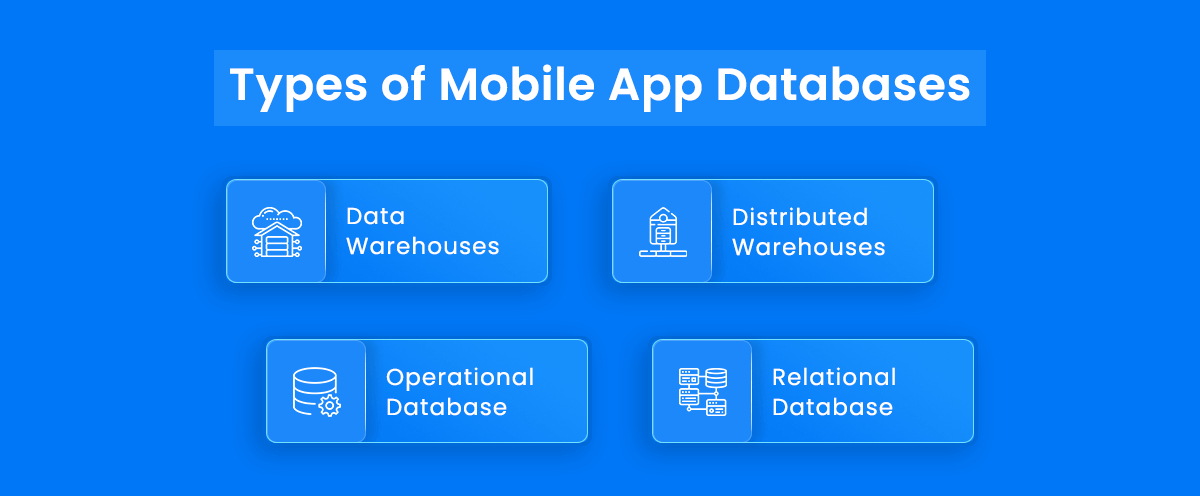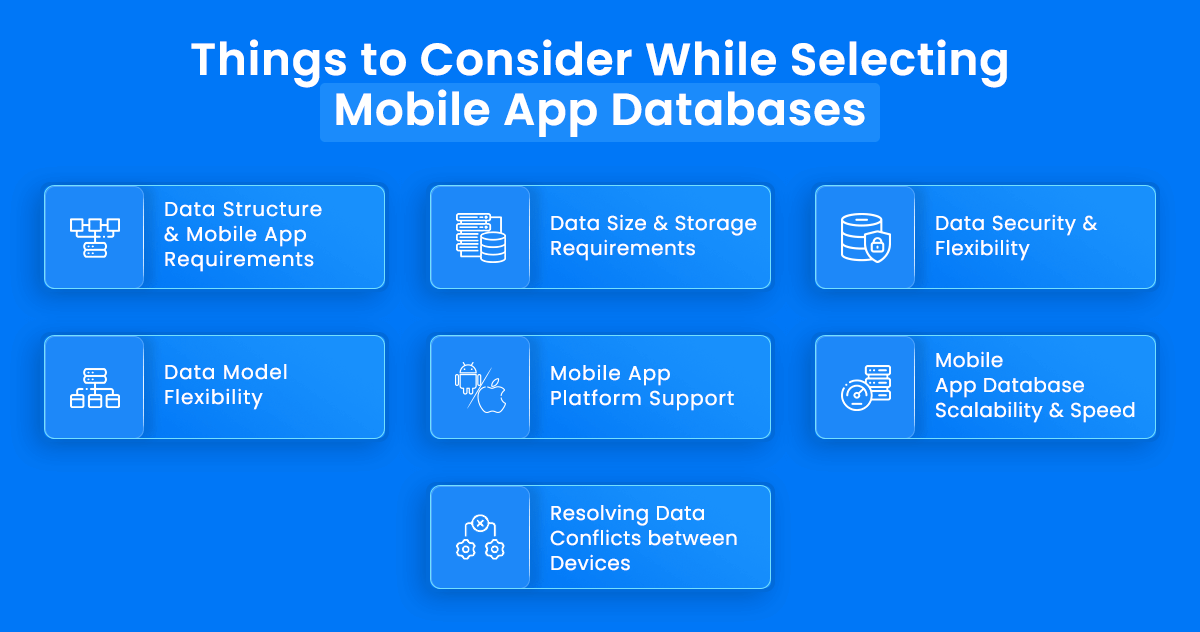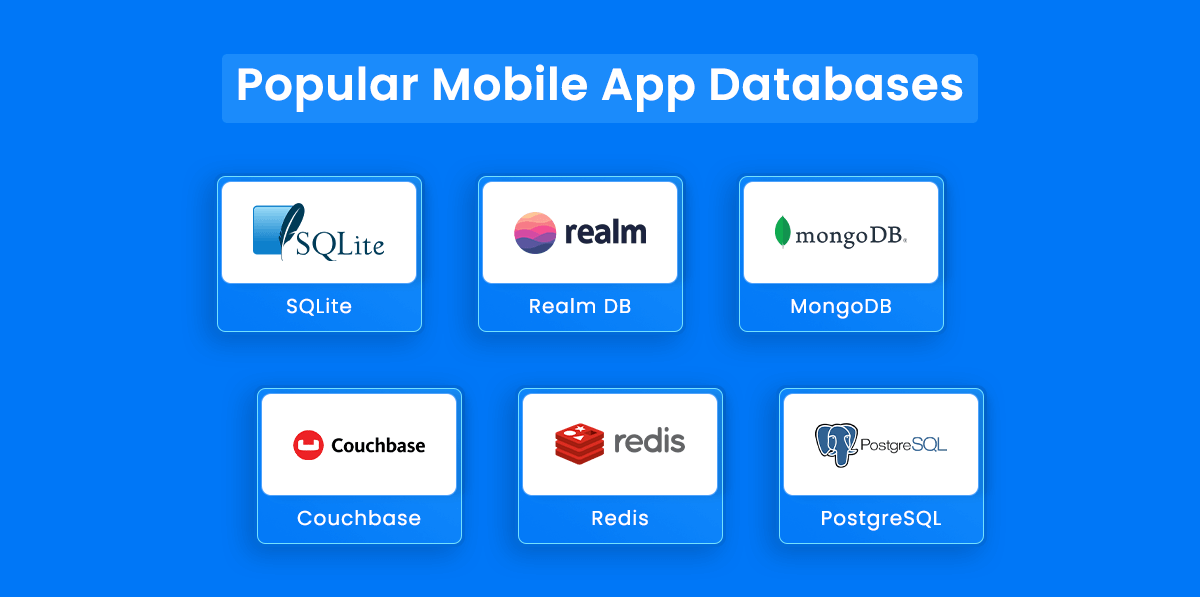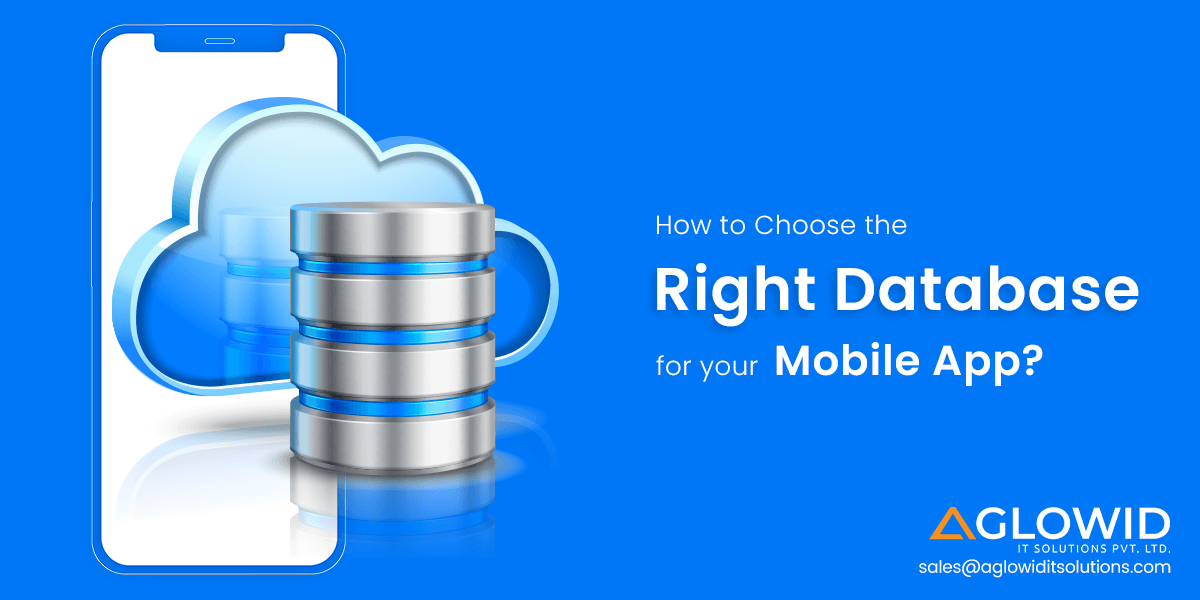Quick Summary:
Selecting the right mobile app database can be tricky, especially as there are many options available in the market. Before selecting the right database for mobile apps, you need to understand your requirement and then select the right database for that function accordingly. This is a quick guide on selecting the right database for your mobile app for your app requirements.
Mobile App Database is responsible for storing all the user information and making it available when needed in the proper context. Different databases have different priorities and different usability.
Your mobile app has different requirements, too, depending on what you’re trying to achieve. It is important to marry the best mobile app requirement to the mobile app database that compliments it the best. A good database can significantly impact the performance of your mobile app.
Importance of Selecting the Right Database for Mobile Apps
- The data becomes accessible from anywhere when you use a database for mobile apps. In addition, you get wireless and offline data access.
- The mobile database is generally lightweight and easy to maintain with minimum effort.
- Since the database system is created synchronized, it helps multiple users access the data seamlessly.
- It allows data to be seamlessly synchronized across various devices like laptops, smartphones, wearable devices, tablets, and more.
Types of Mobile App Databases

1. Data Warehouses
The data warehouse is a type of data management system designed to enable and support business intelligence activities like analytics. As the name suggests, data warehouses generally have large chunks of historical data.
The data stored in data warehouses are derived from a wide range of resources like transaction applications and application log files. The primary purpose of data warehouses is to perform queries and analyze the data.
Data warehouses allow developers to consolidate and centralize large chunks of data. Its analytical skills help businesses to derive valuable insights that can help them improvise their decision-making processes.
As a result, a data warehouse can easily be considered any company’s single source of truth.
Benefits of Data Warehouses
- Subject Oriented – You can analyze data about any particular subject or functional area.
- Integrated – Data warehouses store data from different sources and consolidates them in a central location.
- Time-variant – Data warehouse analyses the changes in data over time.
- Non-volatile – Once the data reaches the warehouse, it remains stable and doesn’t change.
2. Distributed Warehouses
Any database with its inherent components stored across geographically distant locations with no physically shared resources is known as a distribution warehouse. It is an ideal database for your needs if your users are spread across different geographies.
There are two primary types of distributed warehouses – homogenous and heterogeneous. As the name suggests, inhomogenous schema, data structures, software used across all locations are similar while heterogeneous they are all different.
Benefits of Distributed Warehouses
- Network Transparency
- Replication Transparency
- Fragmentation Transparency
- Increased reliability and availability
- Easier expansion.
- Better performance
3. Operational Database
As the name suggests, operational databases allow the users to edit or remove data in real-time. Most of the other database types depend on batch processing, meaning the edits are only made till a certain threshold in resources and time.
On the other hand, operational databases can run your data operations in real-time. Hence, it is the ideal database to store employee, customer, and payroll data.
Benefits of Operational Database
- Greatly versatile
- Fault-tolerant and Highly Scalable
- Highly secured
- Can work with multiple apps without losing the state of the database
- More economical
4. Relational Database
A relational database organizes data into tables linked or related to each other based on shared data points. This enables the users to retrieve an entirely new table from data in one or more tables with a single query.
It allows the users to understand the connection among all available data better and gain new insights for making better and efficient decisions.
Benefits of Relational Database
- Flexibility
- Reduced redundancy
- Ease of backup and disaster recovery
Important Considerations to Select the Best Databases for your Mobile Applications
Now that we have a fair understanding of what mobile app databases are and what purpose they solve, we should next cover the important considerations for you to keep in mind when selecting the right database for your Mobile App Development requirements.
Here are the key important considerations

1. Data Structure and Mobile App Requirements
The data structure plays an important role in dictating how it can be stored and retrieved when needed. Different apps are made on different mobile app frameworks; they have various formats in which their data can be structured. Hence, you need to select the appropriate database to support appropriate data structures that can be used for storing and retrieving data.
If there’s a mismatch, your mobile application will face difficulties retrieving data from your databases. This can also lead to delayed development time as many data issues could come up, making the process complicated and inefficient. The data structure also depends on what functionality you expect out of your mobile app.
For example, offline apps store all data on mobile devices, whereas online apps depend on a server to make their stored data functional. Then, synchronized apps store all the data on a mobile device to be used offline. Still, this data can be updated on the server when the device has internet access periodically.
2. Data Size and Storage Requirements
Another important aspect you need to consider when selecting the right database for your mobile app is data size. Data size refers to the quantity of data you need to store and retrieve critical app data for your app to function correctly.
The amount of data you can store and retrieve without affecting the database negatively varies on various factors such as data structures, the database’s ability to partition data across multiple file systems, and vendor-specific optimizations.
3. Data Security and Flexibility
One of the biggest worries most business owners have when deciding to use a database for their mobile app project is safety and security. Storing your app data on a database service provider can lead to vulnerabilities and data threats if the database for mobile applications is not secured or ethical.
If your app needs to be synchronized and decentralized storage, it is vital to securely access, transmit, and store data. It is essential to address authentication, data in motion, rest, and read/write access for entirely covering this.
Flexible authentication is a must on the checklist, and it should provide options for the use of standard, public, custom authentication providers. These days most apps also require an anonymous access feature. For handling
- Data at rest on the client & server-side – you should look for a mobile app database with file system encryption and data-level encryption.
- Data in motion – the communication should be over a secure channel like TLS or SSL.
- Data read/write access – the database should have granular control abilities over what data can be accessed and modified by the users.
4. Data Model Flexibility
Any mobile app database you select should be flexible enough for you to configure the database in an aptest for your business needs.
If the mobile app database has room for flexibility, it allows the mobile app developers to evolve their model as their requirements change over time. As you already know, mobile phone apps tend to evolve rapidly.
Hence it is very important to have a flexible data model.
5. Mobile App Database and Mobile App Platform Support
Launching an app is no longer limited to turning an app idea to a working app and releasing it in the market. There are various popular platforms and devices that an app can target to experience it in new and intuitive ways. Of course, we all know the popular mobile app platforms like iOS, Android, Windows, and more.
Well, technology has transcended mobile devices and also reached wearables and IoT devices. So you need to decide if you want your app to be available on one platform, multiple platforms, different devices, or any other possibility before deciding on the right database for your mobile app.
Of course, you need to consider your plans with the app, too, before making this decision.
6. Mobile App Database Scalability and Speed
App scalability is one of the most critical considerations most companies keep in mind when developing their app. They want to make apps that can increase in capacity and size to match up with all the additional features they plan to introduce to the app in later stages.
For adding more features to your app, you would need more resources in the form of servers, and hence your database engine will have to keep up and be more efficient. Therefore, an ideal database for your mobile app should utilize all resources and handle simultaneous processing.
For this, the database needs to be multi-threaded.
7. Resolving Data Conflicts between Devices
Any mobile application that modifies the same data on various devices parallelly can create conflicts. The mobile database you choose should be able to support a mechanism for resolving these conflicts.
The flexibility towards the conflict resolution mechanism is an excellent yardstick to decide the right database for your mobile app from the various databases available in the market.
These days, most mobile app databases come with the ability to automatically resolve such conflicts on the device, in the cloud by using an external system, or by human intervention.
This or That – The Right Database Selection for your Mobile App
Certain characteristics differ for different databases. These properties can help you sort out the available mobile app databases according to your need.
You can shortlist your options from the wide variety of databases available on the market.
1. SQL Vs. NoSQL
Regarding mobile app databases, SQL Vs. NoSQL is one of the most discussed and important decisions for any app developer. You need to decide how your data appears, the scalability requirements you might have in the future, and how you will query your data.
 SQL databases are ideal for situations where –
SQL databases are ideal for situations where –
- Data Is transactional
- The structure doesn’t alter frequently or at all
- Data integrity is vast
- You need Analytical queries
NoSQL databases are suitable for situations where –
- Scalability and flexibility are a priority
- Rapid development and repetition is needed
If you need structure, set schemas, and multi-row transactions, go with SQL. It is ideal for requirements like accounting systems. On the other hand, if your business grows rapidly and you don’t require schema definitions, NoSQL will get your project up and running quicker.
NoSQL has the best flexibility and adaptability skills to do so if you have huge chunks of data that need to be churned through data in different structures.
Best SQL vs. NoSQL Databases
| SQL Databases | NoSQL Databases |
| Microsoft SQL Server | MongoDB |
| PostgreSQL | Amazon Dynamo DB |
| MySQL | Redis |
| SQLite | Apache Cassandra |
| Oracle | Couchbase |
2. Open Source Vs. Proprietary
Many app developers complain that data accessibility has become difficult and full of hassle with proprietary formats. If you have the same complaint, you can try using the open-source form for your mobile app database requirements.

For example, suppose you log industrial automation information in an open format database. In that case, it will provide you with automated systems and flexibility of using business analytics, reporting tools, and learning engines for harvesting data with accuracy and transparency.
Best open source vs. proprietary databases
| Open Source Databases | Proprietary Databases |
| Redis | MongoDB |
| MySQL | Memcached |
| MariaDB | Riak DB |
| Cassandra | Couch DB |
| InfluxDB | – |
| RethinkDB | – |
| ArangoDB | – |
3. Managed Services Vs. Self-Hosting
When selecting a database for apps- one more aspect to look out for is if you should go with Managed Services or Self-Hosting. Managed Services are more accessible to set up than Self-Hosting, and have no hassles to maintain.

However, they charge a higher premium for this ease and convenience and require more technical expertise to use. In contrast, self-hosting will give you maximum control, flexibility, and full access to the file system with the ability to change the core tool.
Managed services vs. Self-Hosting services
| Managed Services | Self-Hosting |
| Firebase Realtime Database | AWS EC2 |
| AWS RDS | Google Cloud Engine |
| Cloud SQL | Azure Virtual Machines |
| Azure Databases | – |
Popular Mobile App Databases Available in the Market

1. SQLite
SQLite is a relational database. It is a lighter version of SQL designed especially for mobile. An in-process library implements a serverless, self-contained, and transactional, zero-configuration SQL database engine.
It is commonly used to provide local storage capabilities on mobile phones.
Key Features of SQLite
- Zero-configuration
- Serverless
- Single Database File
- Stable Cross-Platform File
- Manifest typing
- Compact
- Readable source code
- Variable-length records
2. Realm DB
Realm DB is yet another open-source relational database management system. The data can be filtered, queried, interconnected, and persisted and have live objects that are entirely reactive.
Key Features of Realm DB
- Create Mobile Apps
- Concurrency Control
- Object-Oriented Data Model
- Log Component for Synchronization
- Query Interface
- Storage Architecture
3. MongoDB
MongoDB is an open-source, server-side mobile app database. It is a NoSQL database program that is built with scalability and complex app-building in mind.
It uses key-value stores and a relational database for storing objects in JSON documents with dynamic schemas.
Key Features of MongoDB
- Replication feature for better stability and data availability
- Appropriate indexing for better query executions
- Ad-hoc queries for optimized, real-time analytics
- Load Balancing
- Sharding
4. Couchbase
Couchbase is a popular NoSQL cloud database. Its scalability, versatility, financial value, and performance exceeds other cloud databases, making it one of the best databases for mobile apps.
Couchbase uses an offline-first approach to gain the most functionality of your app without connecting to the internet. Instead, it uses an offline local database that your app’s code directly interacts with.
Key Features of Couchbase
- Memory First
- Elastic Scalability
- Transactions
- Persistence
- Analytics
Have a unique app Idea?
Hire Certified Developers To Build Robust Feature, Rich App And Websites.
Wrapping Up!
Mobile apps are highly dynamic and prone to massive changes as per the market’s competition, requirements, and demand.
The constant need to update your mobile app with new resources and increase its capabilities while maintaining the same efficiency in its functioning requires a robust and perfect fit database to handle its requests gracefully and efficiently.
Therefore, one most important factor for deciding on a database for your mobile app has to be flexibility in most cases. I hope this helps you decide on the right database for your next mobile app project.



